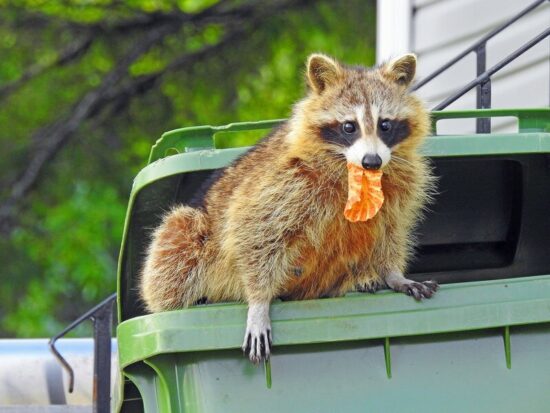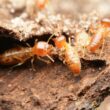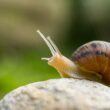Raccoons eating trash is not an uncommon occurrence in the city. In fact, it sometimes seems like these pesky animals actually prefer garbage!
This guide will help you understand why raccoons eat trash, and why it seems like they can eat just about anything..
Table of Contents
Why Do Raccoons Eat Trash?
Raccoons are one of the most frustrating backyard pests you can encounter. These mammals are prevalent worldwide, and they have no problem living near humans. While they might have a cutesy appearance, these creatures are the epitome of filthy.
Many people refer to them as “trash bandits,” and it’s not hard to see why! One of the most defining characteristics of raccoons is their gross penchant for eating trash. The most likely spot where you’ll encounter these animals is while they’re rummaging through your garbage bin!
But why do they eat trash?
Garbage Is Easily Accessible
Believe it or not, one common theory is that raccoons eat trash simply because it’s available.
In the wild, these critters can eat a wide variety of foods. They can pick berries, eat plants, and more. However, they prefer to stick around bodies of water to hunt small fish, crustaceans, and frogs.
When humans develop land, they move into the raccoons’ territory, forcing this unique cohabitation. In most cases, the animals stick around. Suddenly, they have neighborhoods full of potential food sources to rummage through.
Why go to the trouble of hunting and gathering when garbage is readily available?
Raccoons are a bit more clever than most people realize. They’re highly opportunistic and work smarter instead of harder. When there’s an abundance of trash around, it’s a quick meal that they don’t have to work super hard to get.
It’s all about being adaptable. Of all the creatures in the animal kingdom, raccoons are some of the most resilient. No matter how developed their land becomes, raccoons will adjust and find a way to thrive. That often includes changing their diet and eating trash.
Expert Tip: Raccoons have no other choice in many cases. When neighborhoods pop up, their natural food sources go away. The only option for survival is to consume foods that are easy to find and access.
Raccoons Are Omnivores
Another possible reason raccoons choose to eat trash is that they’re omnivores. Other wild mammals might exclusively feed on plants or hunt other small animals for prey.
Raccoons do it all!
As we said earlier, wild raccoons in rural areas can eat many different things to stay alive. They’ll look for food on the ground, stay near water to fish, and even take advantage of dead animals they come across.
These creatures are not picky. They can eat anything available to them, including garbage.
Why Do Raccoons Rarely Get Sick From Eating Garbage?
Ever wonder how raccoons do it? For humans, eating something that’s even mildly overripe could lead to some major stomach issues. Yet, raccoons can eat literal garbage without missing a beat. Most are eager to rummage through your trash bin, viewing it as a treat!
It turns out that raccoons are built to handle the effects of eating trash. While humans would undoubtedly keel over if they attempted to eat the same things, raccoons have unique biological properties that make eating garbage relatively safe.
The first advantage they have is their long intestinal tract. As food travels through the digestive system, it breaks down. Because their intestines are more extended, their bodies have more time to process everything.
By the time the food gets absorbed, their system has already taken out most of the potential toxins in the trash they eat.
Another distinct biological trait is the raccoon’s acidic stomach. Their bellies have a much lower pH level than humans. As a result, the harmful bacteria that would otherwise cause trouble for the raccoon dies before it can wreak havoc.
The animal’s stomach is similar to a dog’s. Both dogs and raccoons can eat some nasty stuff that would curdle our stomachs within minutes.
Finally, raccoons are smart enough to know what to avoid. Once again, these animals don’t get enough credit for how cunning they are. They’re more intelligent than they come off.
Expert Tip: Some researchers say that raccoons test their food before eating it. Many will dunk trash in some water to “clean” it and test its edibility. Pair that with natural instincts, and raccoons do a fine job of steering clear of those potentially dangerous foods.
What Trash Will Make Them Sick?
Despite their biology working in their favor, raccoons aren’t indestructible. While they can eat trash, some items can make them sick.
As mentioned earlier, most raccoons know what to avoid. As a result, true stomach upsets are pretty rare for these animals. But if a dangerous food does get into the mix, it can cause significant pain and discomfort for the animal.
Macadamia nuts, chocolate, and raisins are all toxic to raccoons. They won’t necessarily die or experience anaphylactic shock if they accidentally eat those items. However, the results are akin to what happens if a dog eats chocolate.
It has the potential to be fatal if consumed in large quantities. But eating only a little bit of chocolate, raisins, or macadamia nuts usually results in nothing more than vomiting, diarrhea, and stomach pain.
Garlic and onions are also problematic, which is why you might see raccoons avoiding food scraps that end up in the garbage. These common flavorful vegetables reportedly cause anemia in raccoons.
If they consume a ton of garlic and onions, it can make the body go into shock. It may even lead to death.
Other food found in the trash that could lead to illness include bread and dry cat food.
Expert Tip: Interestingly enough, you might notice raccoons avoiding super processed foods like chips and snacks.
Too much processed junk food can make raccoons sick. They can eat it in moderation, but relying on it to survive isn’t the best choice. So, they often have a few bites and move on. Sounds like we could learn something from them!
How To Stop Them From Eating Your Trash
Raccoons are surprisingly good at sneaking around and getting into trash bins. They have nimble fingers and dexterous hands perfect for prying open lids.
The only thing you can do to prevent raccoons from eating your trash is to seal it up and hide it away.
Choose a highly-secure trash bin. We’re not talking about simple snap-in or flip-up lids. You need a trash can that you can lock shut! There are plenty of options available that utilize locking handles for extra security.
Another thing you can do is tie your food up to avoid wafting smells. Use impenetrable trash bags that block odors. If a raccoon can’t detect the trash through smells, they’re far less likely to pursue it.
When it comes to hiding, consider keeping your bins out of sight. Lock them up and avoid putting them in plain view. It’s also good to clean up compost bins, bring pet food inside, and remove any other potential attractors from your yard.
Conclusion
Now that you know why raccoons eat trash it will be significantly easier to stop this from happening on your property.
All you need to do is follow some of the recommendations above, and your garbage will be safe.


